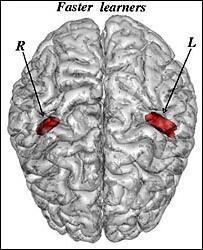April 07, 2006
Linguists 'have different brains'
 That's
the headline for a recent BBC
report from the frontiers of neuroscience. Even though "have different brains" is set off in quotation
marks (using the peculiar headline-writer's technique of putting a
scientific claim in quotes even if it's not quoted material), I would
have preferred seeing the scare-quotes around "linguists"
instead. You see, it's not professional language scholars who are
differently-brained, at least not necessarily. The article describes a study by
neuroscientists at University College London finding that fast
learners of non-native speech sounds have more "white matter" in the
left part of a brain structure known as Heschl's gyrus. To determine this, the researchers trained native French speakers to hear the difference between dental [d] and retroflex [ɖ]. (This is not a phonemic difference in
French or English, but it is in a language like Hindi.) The subjects
who were fastest at learning the dental-retroflex contrast showed a
marked asymmetry of white-matter density between their right and left
Heschl's gyri.
That's
the headline for a recent BBC
report from the frontiers of neuroscience. Even though "have different brains" is set off in quotation
marks (using the peculiar headline-writer's technique of putting a
scientific claim in quotes even if it's not quoted material), I would
have preferred seeing the scare-quotes around "linguists"
instead. You see, it's not professional language scholars who are
differently-brained, at least not necessarily. The article describes a study by
neuroscientists at University College London finding that fast
learners of non-native speech sounds have more "white matter" in the
left part of a brain structure known as Heschl's gyrus. To determine this, the researchers trained native French speakers to hear the difference between dental [d] and retroflex [ɖ]. (This is not a phonemic difference in
French or English, but it is in a language like Hindi.) The subjects
who were fastest at learning the dental-retroflex contrast showed a
marked asymmetry of white-matter density between their right and left
Heschl's gyri.
You can't really blame the headline writer for using the word "linguists" as shorthand for "people who are adept at learning non-native phonemic contrasts." But it plays into a popular preconception that linguists (the professional kind) are natural-born polyglots, picking up the sound patterns of foreign languages at the drop of a hat. Many linguists do indeed fit this description, but it's not a prerequisite for study in the discipline, especially for fields outside of phonetics and phonology. (This brings to mind dystopic imagery of children undergoing brain scans to determine their career paths. "Look at all the white matter in Jimmy's left gyrus! He's going to be the next Ladefoged!") In any case, learning a foreign language involves a lot more than mastery of the relevant phonemic distinctions, though that obviously helps.
I should note that the earliest recorded usage of the word "linguist" is not far from what the BBC headline writer used. The OED gives the earliest sense as "one who is skilled in the use of languages; one who is master of other tongues besides his own," with a first citation from Shakespeare's Two Gentleman of Verona:
And partly, seeing you are beautified
With goodly shape and by your own report
A linguist and a man of such perfection
As we do in our quality much want.
The first citation for "linguist" in the sense of "a student of language" comes from John Wilkins in 1641, some 50 years later, and even then there was no clear distinction with the "polyglot" sense. The word "philologist" was long the preferred term for a language scholar — as late as 1922 Otto Jespersen felt compelled to write: "I think I am in accordance with a growing number of scholars in England and America if I apply the word 'linguist' by itself to the scientific student of language (or of languages)." I tend to agree with the Tensor, who feels that professional linguists shouldn't be so annoyed at confusion over the different meanings of "linguist," considering that scholars "hijacked" the word in the first place.
[Update: Mark Liberman investigates the research itself, not just the media coverage, in this post.]
Posted by Benjamin Zimmer at April 7, 2006 10:28 AM